#not just phonetically. they use the same kanji
Explore tagged Tumblr posts
Text
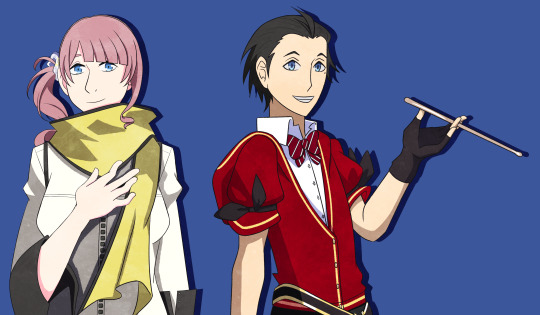
Mochizuki 🌕
#project sekai#prsk fa#prsk#persona 3#p3#honami mochizuki#mochizuki honami#ryoji mochizuki#mochizuki ryoji#prince's art tag#so yesterday i made the discovery that they have the same last name#not just phonetically. they use the same kanji#so ofc i drew a little something#their last name means full moon which makes sense for their characters#honami loves constellations and space not to mention her and her childhood friend's lives were changed when they saw that meteor shower#and the band she's in as named after said meteor shower#and ryoji is an important character in a game where the full moon plays an important part in the narrative#i havent been putting my signature on my art. im too lazy to fix it
26 notes
·
View notes
Note
This is going to be an obvious question to anyone who's familiar with the language, but how does one type in Chinese? All the languages I've studied have had alphabetic writing systems, so to me foreign language typing is just assigning different letters on the keyboard and hitting them in order the same as English.
I imagine there's some way of entering the elements of each glyph with a command that tells it where to place it? I tried googling and just got a bunch of articles about how autocorrect can suggest Chinese characters when a user types the words in pinyin, but this sounds like a laborious and clunky system for someone who reads and writes Chinese fluently, and it wouldn't nessecarily exist on all devices.
--
(same anon wondering about typing Chinese characters) I also figure that if converting from pinyin was the primary or only way to get digital Chinese characters, then a lot more online spaces would just use pinyin in the first place and save everyone the trouble. The people writing multichapter fanfics or chatting away on social media in Chinese definitely have a fluent way to type their language that probably doesn't involve converting the entire text from an unrelated writing system, but these articles just aren't telling me what it is.
Ahahaha. Anon... phonetic entry is so much easier than other methods.
No, nobody enters characters while typing by picking radicals and where to place them. There are ways to look up an unfamiliar character that use radicals. There are also apps that let you try to draw something by hand, then attempt to figure out what you drew. But, again, that's for unfamiliar things, not typing up a story.
Computers were developed by English speakers and others with alphabets. Phonetic entry would probably be easiest anyway, but with the early infrastructure geared towards it, it's definitely easier.
There was an interesting phenomenon in Japanese (I'm not sure about Chinese) where The Youth™ were using fewer and fewer complex or less common kanji in... I want to say the 80s or 90s. The usual suspects moaned about the death of literacy...
Then cell phone/computer typing came along. If you knew the word, you didn't have to remember every single detail of how to write it. And people responded by using hella kanji all over the place, including lots of much rarer characters that a person would often recognize on sight but not remember perfectly enough to write by hand with confidence.
English spelling is tricky, but just learning 26 letters and then using them in a way that makes sense to a native speaker of [whatever] isn't. People are going to know pinyin. It's not a hardship to use it.
661 notes
·
View notes
Text
GX Character Names - an in-depth analysis
(i promise there's more substance than you think)
⇀ yūki jūdai (遊城 十代)
« yū (遊) - play, enjoyment » « ki (城) - castle »
The yū (遊) uses the same kanji that all the other Yu-tagonists have, but it's probably more relevant to Judai than any other protagonist. 遊 is a particle with many associations, most notably play and games, but also enjoyment, freedom, travel, and hedonism. All the protagonists play children's card games, but Judai is the one who most treats it like a children's card game, even when he shouldn't. His signature phrase is literally "That was a fun duel!"
The ki (城) kanji means castle and could be a slight nod to his past life, but more importantly, yūki is a homophone of 勇気, meaning courage and fighting spirit -- fitting for his hero theming and pure shonen protag energy.
« jū (十) - ten » « dai (代) - generation »
First of all, there's a fun connection with the first character of Judai's name meaning 10, to the first character of Manjoume's name being 10,000, as well as the Tenjoin siblings phonetically having 'ten' in their name (Fubuki even references it by signing his name '10join').
The second character dai (代) is fitting given the name of the show. The G in GX stands for "Generation." And the X stands for "neXt," but get this -- X is also 10 in roman numerals.
That's right... Judai's name is literally GX.
It goes deeper though. The more blatant meaning is that taken together, 十代 means adolescence, or teenager (it has similar etymology to the latter, something like "the tens ages"). But jūdai is also a homophone of 重大 - serious, grave, of great importance. That's it, those are literally the themes of the show in one name.
GX is ultimately a coming of age story. Judai is a kid who just wants to play games and have fun, but over the course of the show, is forced to give up that childish simplicity in the face of adult responsibility. He starts off believing that being a hero is just about courage and shonen ideals, and learns though grave consequences that it's not, and that being a hero isn't fun at all.
⇀ manjoume jun (万丈目 準)
« man (万) - ten-thousand » « jou (丈) - height, strong » « me (目) - eye, seeing »
This is where the 1, 10, 100, 1000 chant comes from. Combined with the second character, it feels grandiose and ego-inflated, then when you add on the final character, me (目), associated with seeing, the vibe you get is something like "looking down on (from a height of 10,000)." All of which makes his insistence on being called Manjoume-san even more conceited, but also gives you an idea of how the Manjoume family name looms over Manjoume himself.
« jun (準) - semi, secondary »
In contrast to his family name, his given name shows us the other side of Manjoume's character. jun has several kanji spellings with positive and auspicious meanings. One of them, 潤 (to profit, to become wealthy), would have been an obvious choice for our rich boy.
But no, instead they chose 準, a kanji with a meaning that can be difficult to pin down. It's associated with preparation and reserves, such as reserve funds (準備金) -- in other words, being the back-up, extraneous. In the workforce, it indicates assistants, associates, juniors (準会員, 準社員). It's part of the words for semi-finals (準決勝) and runner-up (準優勝). Ultimately, it's a character that carries a meaning of being secondary.
Underneath all that snobby pomp, Manjoume feels inferior to his brothers, and can also never win against Judai, and this drives his character arc. The tension between his last and first names, of "looking down on" and "being secondary," is emblematic of Manjoume's internal conflict.
This is driven in even further by the fact that his brothers have first names that complement their last name. The first character of his oldest brother's name, Chosaku (長作), means leader, senior, or superiority (which directly parallels the meaning of associate for Jun, and also fits with Chosaku being a businessman), but it's also phonetically the same as 兆 which means one trillion, basically exaggerating upon the 10,000 of his last name.
Meanwhile his middle brother Shoji's name (正司) starts with the character associated with truth and lawfulness (ironic considering he's a slimy politician), was archaically used to mean of higher rank in court (again paralleling Jun), and also has a niche meaning of 10 to the 40th power, or... 10,000 trillion trillion.
⇀ marufuji shou (丸藤 翔) and marufuji ryou (丸藤 亮)
« maru (丸) - circle, entirety, perfection » « fuji (藤) - wisteria »
Circles are significant symbols in Japanese culture, used in divination to represent completeness and perfection, and the kanji 丸 also carries this meaning. Wisteria is a cultural symbol too, representing love and longetivity, with a tie to royalty and nobility.
All together, the name rings as elegant and dignified. In season 1, we see how Shou feels pressured and unable to live up to the name he shares with his brother, who embodies it. Perfection is a key part of Ryou's character -- in the graduation duel, he even acknowledges that he has reached perfection, but also that it is a limit, setting up for the deconstruction of the theme.
« shou (翔) - to soar »
Shou's name simply represents his character arc, starting from Osiris Red with no confidence in himself, and ending in Obelisk Blue, surpassing his brother who has an opposite arc of "falling." It's also a homophone of 小 meaning small or younger.
« ryou (亮) - clear, brightness »
The kanji used for Ryou's name is part of words like moonlight (亮月), rightfulness (亮直), as well as words associated with royalty, like mourning the emperor (亮闇). All of which vaguely match the tone of Ryou's character as "the Kaiser." The Cyber Dragons are also light attribute, and he is introduced with "light" theming which is all reversed after his turn to the dark side in season 2.
The kanji can also be part of the word ryousatsu (亮察) which can mean to take into account, to consider, and to sympathize. A core theme of Ryou's character is having respect for his opponent and not underestimating them -- this is why you'll often hear Shou referring to "respectful dueling," and also why Power Bond is their signature card, because without respecting your opponent's capabilities and taking their field into account, the card will backfire on you.
Oh, and as an aside, Ryou does not use the same kanji as Bakura Ryou from the original Yu-Gi-Oh, who uses 了 -- completion or ending.
⇀ tenjoin asuka (天上院 明日香) and tenjoin fubuki (天上院 吹雪)
« tenjo (天上) - heavens » « in (院) - institution »
The first part ties into the Cyber Angels that Asuka uses, as well as the Atmosphere cards that Fubuki uses in the manga. It's also referenced by Fubuki in his embarrassing pickup line ("What do you see above?" "Ten... join!" This is the guy that Manjoume thinks is the love magician)
The second part is a particle used for institutions, particularly stately ones in government or higher education, which makes sense if you believe Asuka becomes a teacher. Overall, it's a refined name which perfectly suits Asuka, and not Fubuki.
« asu (明日) - tomorrow » « ka (香) - fragrance »
The first part of her name is why Jim calls her Tomorrow Girl, which spawned the Asuka/Jim ship by itself, but it also suits Asuka really well, because her character arc in season 4 is ultimately about moving on and embracing the future. She leaves behind the safety of Duel Academy and takes a step into the unknown by going to America.
« fubuki (吹雪) - blizzard »
This is why he's nicknamed the Blizzard Prince. Otherwise, he doesn't have any connection to blizzards, but Asuka uses ice decks in the Society of Light and in the manga, so the Tenjoins both have some ice theming.
⇀ misawa daichi (三沢 大地)
« mi (三) - three » « sawa (沢) - marsh, brilliance »
Another number-themed name alongside Judai's 10 and Manjoume's 10,000. sawa is a common kanji in names, but you could argue it ties into his signature monster, Water Dragon.
« dai (大) - great, vast » « chi (地) - earth »
Of his six decks, we see two of them, his water deck and his earth deck. The latter of which he uses against Tania, who in turn uses her wisdom deck -- which is perfect because daichi can also be a homophone of 大知, which means great wisdom. Nerd.
⇀ tyranno kenzan (ティラノ 剣山)
« tyranno (ティラノ) »
This name is derived from tyrannosaurus rex. Because he's got dino fucking DNA.
« ken (剣) - sword » « zan (山) - mountain »
The literal characters are fitting for Kenzan, who has an offense-focused deck of mostly earth attribute monsters, and a personality to match. But as a whole, 剣山 refers to a tool in traditional flower arrangement. The kenzan is the base in which the arrangement is stuck into, a foundation which keeps the structure secure. Kenzan ultimately looks up to Judai (and calls him aniki) because he wants to be a leader like him, one who can bear the weight of his followers' expectations. We don't get much of this after his introductory episode, but I still think it's a fitting name for a dependable guy.
⇀ saotome rei (早乙女 レイ)
« sa (早) - early, quickly » « otome (乙女) - maiden »
This one is pretty on the nose. The first character refers to how she came to Duel Academy early, being younger than all the other characters, and not joining the cast until much later. The otome is the same used in her signature card Koisuru Otome, or Maiden in Love, and also refers to a romance genre for girls. As a whole, saotome is also a term for a girl who plants rice paddies.
The name may also be a reference to Saotome Ranma, the protagonist of Ranma ½, which is about a boy who changes into a girl when splashed with water.
« rei (レイ) »
Rei is a unisex name with many different kanji spellings and meanings, but instead, Rei's name is spelled with katakana. Given that she dresses as a boy twice and uses masculine pronouns in Japanese, this may be to make the gender more ambiguous than if kanji with more gendered connotations were used, such as 麗 (graceful) or 鈴 (bell sound) which are more feminine, or 零 (zero), or 令 (authority) which are more masculine.
If you ever wondered, Ray from Arc-V also uses the same katakana spelling, though this may be because most of the Arc-V characters from other dimensions use katakana, which sounds more foreign or ambiguous in origin. Meanwhile, Rei from Zexal uses 零 (zero).
---
Feel free to correct me if anything doesn't seem right! I'm not Japanese and may have read too much into some of this.
#gonna start putting out more content that isn't art#the gx thoughts have been contained for too long#judai yuki#jun manjoume#shou marufuji#ryo marufuji#asuka tenjoin#fubuki tenjoin#daichi misawa#tyranno kenzan#rei saotome#yugioh gx#ygo#ygo gx#pico commentary
185 notes
·
View notes
Note
HI IT'S ME AGAIN . okay so me and my friend came up with emojis for some characters..!!! 🎬 for Sakaki as he's a stage director I think..? 📽️ for Tomomi-chan. . . 🌸 for Sakurako as that's the closest we're gonna get for her me thinks.. (and also because some people use 🎪 for wxs..) 🍭 for Hinata(? I can't remember her name..) 🌹 for Byakkomachi as I can't think of anything else+the 4koma.... obviously 🐇/🐰 for Usa.. I can't think for other unit NPCs as I'm a wxs oshi and only read wxs event stories..
For Sakurako I suggest🐉or 🐲 since seiryuin is the blue dragon. Her first name doesn't actually use the kanji for sakura, it's just phonetically the same. I also put forward ⌚ for shousuke since it relates to his hobby, but that might be a bit obscure.
52 notes
·
View notes
Text
Nerdy cultural details about the Hashira
Some details can be hard to pick up without context or in translation. Here's a handful for fun:
Breath names:
The "Mushi" (蟲) of "Mushibashira" (蟲柱) does not necessarily mean "insect." It's also not the more commonly used "mushi" kanji (虫). Kanji is often formed with many components compounding together to make new meanings, and 蟲 is a crowd of three 虫. While it might be tempting to simply say that this is a whole bunch of 虫, I've also heard this described as 蟲 being the more abstract idea of the concrete 虫, or that 蟲 went through a resurgence in popularity shortly before the Taisho Period. 虫 is preferred nowadays for its simplicity.
In either case, it's not necessarily "insects." Rather than being limited to six-legged creatures, "mushi" is a catch-all term for many kinds of creepy-crawlies that simply do not fit in other categories of animals, so spiders and centipedes and worms are all part of it. Actually, the term was originally used for snakes!
Next, what are picturing when you hear "Stone Hashira"? Something in your hands that you can throw? A big stone to lay on for warmth after training in a waterfall?
You could think even bigger than that, because the "stone" kanji used is "iwa" 岩. This is usually something at least as big as the boulders Himejima pushes around to train with, but it could just as well be a whole cliff.
So then how about that issue raised about how you can never refer to "Flame Breath" as "Fire Breath"? This might be a review since it gets brought up a lot, but it's worth restating because it makes a lot of sense in context.
First, we have two kanji to work with: 炎 for flames, and 火 for fire. To make a long linguistic history short, Japan adopted written pictographic characters from China, smashed and smooshed them around to fit the spoken Japanese language, and eventually many kanji wound up with multiple pronunciations. Case in point, 炎 is "hono'o" in the context of Flame Breathing (Hono'o no Kokyuu), and "en" in the context of "Flame Hashira" (En-bashira).
火 likewise has multiple pronunciations, but a common one is "hi." Another simple kanji that can be read "hi" is 日, the sun.
Therefore, even if they are written differently, "Sun Breathing" and "Fire Breathing" would sound the same, as "Hi no Kokyuu." This also makes it easy for "Hinokami" to be construed as "Fire God" instead of "Sun God." But why stop there, really? If you want to get into older Japanese, sometimes phonetic "hi" was used in simple reference to the power of gods.
Symbolism:
This is still somewhat linguistic rather than symbolic, but you know how Sound Breath is derived from Thunder Breath?
It's worth pointing out that "Kaminari" (雷) in "Kaminari no Kokyuu" is in reference to the sound, as opposed to something like "Ikazuchi no Kokyuu" for "Lightning Breath" in reference to the sight. We can get really, really nerdy about Japanese words for thunder and lightning and how they relate to Kimetsu no Yaiba, so I already did that here.
What's more interesting to me in regard to Sound Breath is that it takes the "sound" concept of thunder and pushes it--this time with a bit of a firework motif, again in a way that would stress the sound instead of the dazzling light. Both Uzui and Zenitsu have exceptional hearing and are exceptional users of their Breath techniques, so this is either curious that a discerning sense of hearing might help, or ironic that they use such loud styles with their sensitive ears.
Moving on to snakes! There's really no shortage of serpent symbolism, so we'll just focus on a handful of examples. I have already written extensively about the positive associations snakes have with riches, especially white snakes. This is ironic, given Iguro's distasteful paste driven by riches.
Some of the other positive associations with snakes are that they are a water element animal on the geomancy system borrowed from China. Makes sense that this Breath would be derived from Water Breathing! There are many shrines dedicated to snakes and their gifts of rain and clean water, however, water can also be dangerous. A common interpretation of a major legend about an eight-headed giant serpent, the Yamata-no-Orochi, is that it symbolizes the destructive power of a flooded river. But hey, at least snakes are often equated to dragons for having the same water association, so that's pretty cool.
Setting aside the water association, the serpent itself can likewise be considered in negative lights. In the centuries leading up to the Taisho Period, it became commonplace in Buddhist teachings and entertainment to compare jealous women to snakes. This association with woman also adds another layer of cruel irony to Iguro's past.
On a happier note, let's move on to cherry blossoms!
Well, not always happy, seeing as they are known to scatter tragically soon (I am shaking my fist at you, Gotouge). Cherry blossoms are also heavy with all the directions you can go in with symbolism, and I don't have any particular take on why they are part of the overall motif of the Love Hashira (see here for a little commentary on why it is "Koi" 恋 and not "Ai" 愛).
However! I do want to point out something very clever Gotouge did!
You know how Mitsuri's hand guard looks like four hearts that all meet at their pointy ends? This is actually a traditional cherry blossom motif!! Not a very common one, which is why I find it so sly.
Personal Names:
Bear with me, this section will get slightly more speculative, as names are always up to interpretation. I should know, I've done a lot of that for this series.
Remember how kanji can be read in multiple ways? Here's something simple you'd see right away in Japanese but that gets lost in translation to most other languages. Both Sanemi and Genya have 弥 as the second character in their personal name (as "mi" or "ya"). This was not the case for all their siblings, but it's cute that the two of them share it anyway.
So what does it mean? In modern kanji dictionaries, it's pretty bland: "increasingly." However, this kanji has more interesting use and associations that that. It was originally 彌, which carries more of an image of a stretched bow, or how something might go wide and disperse. As a child's name, this might include some hope that they might grow big and tall and go to great places. It is also commonly used in expressing the names of Buddhist deities in Japanese, but it is used only for the "mi" sound instead of the meaning in these cases. (Still, 弥 is one of the "Namu Amida Butsu" characters all over Himejima's haori, which also adds a little cuteness to his associations with Genya.)
So how about someone else with a name that closely matches his brother's? We get a pretty good explanation of Yuichiro (有一郎) and Muichiro (無一郎), with 有 and 無 being opposites (to exist/to not exist). While 有 might be more straightforward in wishing for Yuichiro to have all his needs met, the "mu" in "muichiro" is for "limitless/infinity/etc, etc."
But also!!
It bares distinct resemblance to a common Zen phrase, "Honraimuichimotsu" (本来無一物), with "muichimotsu" meaning "nothing exists" (and therefore, you have nothing to worry about, just be happy).
Speaking of resemblances, "Tomioka Giyuu" has two kanji in common with the name of the mangaka of Hunter x Hunter and I sometimes wonder if he was named in homage. But that is neither here nor there, and I'll just finish today by focusing on "Giyuu" (義勇).
This is pretty basic and straightforward: "loyalty/justice" and "bravery/courage." Pretty lofty. Put them back together and it's basically a set term for "heroism."
However, put it together with other terms for squads or armies, and this is the now the word for "volunteer soldier" or "volunteer army." Historically, it would continue to be used a few decades after Kimetsu no Yaiba takes place, but the decades prior, there were "Giyuutai" organized volunteer troops as well. Perhaps Giyuu had ancestors who fought as volunteer soldiers? Who knows.
117 notes
·
View notes
Text

yapping about how i approached translating karamatsu's brand new world. just discussing the localization liberties i took and other things i think are interesting. i just love yapping sorry
part 1/4 because i forgot about tumblr post image limits lol
establishing my ethos: im still learning japanese but have been translating (chinese -> english) for over 7 years, so my translation skill is higher than my japanese skill. if there's anything i get wrong here pls point it out!!! i usually translate mostly songs, anime (donghua), and manga
The Title

japanese has multiple alphabets: 2 phonetic ones and 1 derived from chinese characters (kanji) that dont tell you anything about how they're pronounced
kanji characters have multiple pronunciations. for example, 心 can be pronounced "kokoro" or "shin" depending on the context it's used in.
"how do you know which kanji pronunciation to use" you guess. alternatively, media geared towards children (who have lower language skills) will sometimes spell out the right pronunciation above the kanji in little letters
sometimes people will just make up their own pronunciations for kanji for Style Points, in which case they will also spell out the intended pronunciation above the kanji
so this title actually reads "matsuno karamatsu's brand new morning". however the Style Points pronunciation guidelines indicated that this is pronounced "Brand New World". i deliberated over this for a while and ended up going with "brand new world" because the phonetic pronunciation is in english so i assume this would be the preferred title for an english localization. unfortunately this did lose the interesting double reading of "morning" and "world" but sometimes it just be like that.
Chapter 1





every time choro says something about the chopsticks in this first part, he's repeating the same thing each time: "Stop [pointing with your] chopsticks". but this 1. doesn't sound very natural in english, and 2. is too long to fit into these speech bubbles.
translations often have to take liberties due to the medium. in anime subtitles, they need to consider how fast a watcher can read the subtitles. in manga, it's often about how many words they can fit in a vertical text bubble.
the underlying impression is that choro is annoyed he even has to tell oso to stop pointing with his chopsticks (this is common sense, you're a grown ass man, why don't you know table manners, etc), so i tried to write it in a way like he's saying it short and snippy like an annoyed mom who has already reminded you 5000 times about this exact thing: Chopsticks.


oso calls totty "あざとい" here after hearing that he's trying out pancakes at a new cafe. as far as i can tell, this roughly translates to "cunning" or "sly" and is used to describe women kinda derogatorily, like a girl at the office who speaks harshly to the women but sweettalks to men (like tsunoda from aggretsuko).
i couldnt really think of a natural-sounding equivalent to this implication in english, so i settled on the kind of close "coquettish" to get across that oso is calling totty girly in a strange and insulting way. oso's dialogue here literally goes something like "sly.... you really are sly...", but since "coquettish" is kind of a weird word to use in english, i ended up localizing this around to suit my weird word choice to make it sound like oso was thinking for a second about the right word to call totty, which i also think comes off as a little more natural-sounding


japanese (and chinese) have a plural second-person pronoun, but english doesn't (besides y'all, which i did use in oso's dialogue earlier lol) which is a real headache and almost always needs some creative thinking to get sounding Normal. this was a relatively straightforward case: "how would a father address his sons as a collective?" -> "Boys"
CHAPTER 2


the dreaded jp onomatopoeia without an english equivalent. im lucky that these boys' whole gimmick is being from an old cartoon so i could get away with the very cartoony "honk" sound effect for "blowing one's nose".


the source material always translates イタい as "painful" so i do it too but i wish osmt had come out like just a few years later when "cringe" was in the common vernacular because it's a way better localization. in my opinion.
also a minor note: in the first bubble totty is actually repeating kara's words back at him "someone's? watching? me?", which is made clera by him using kara's self-pronoun (オレ) and not his own self-pronoun (ボク) (if you don't know about self-pronouns i will talk about them more in a future note). however this nuance is lost in english and could be misconstrued so i just went and made it so he's repeating back what kara said but not using the exact words


"頭おかし" does literally translate to "strange in the head" but colloquially just means "insane" or "crazy". but ichi is being really harsh to kara here, and kara does start questioning his mental sanity later in the chapter, so i went with a more harsh translation here that specifically references the head. also "YOU'RE INSANE" does unintentionally have a different meaning to most of us here on tumblr dot com, doesnt it lol


i dont know what the consensus is on giving iyami a french accent when localizing him. it's probably overkill to do both this AND keep the zansus. however i cant convey a mid-atlantic accent in writing so this is my next best way to convey that iyami talks very strangely. also it's funny


this panel was really hard to redraw. please clap
anyways same use of "strange" here as before with the head thing ("crazy") but it can also have the vibe of "abnormal". i thought "is something wrong with me?" helped convey both these meanings. come to think of it later in chapter 6 i translate okashi very literally as "strange". maybe i shouldve said "is something wrong with me" there, too....
CHAPTER 3


jyushi literally says "why do we do the olympics?" here. i localized it this way because it means essentially the same thing and is funnier. dats the art of translation babyyyyy


japanese personal pronouns quick rundown: in english we tell others to refer to us as different pronouns- him, her, they, etc., but we only have one pronoun to refer to ourselves with (I). japanese has many self-pronouns, and which one you use to describe yourself with is usually based around context and personality (some pronouns are more polite to use than others, some give off the connotation of being stuck-up or of being a country bumpkin, etc). this is helpful for characterization and also being able to tell who is talking through written dialogue
we aren't meant to know who this figure is at first, but we're also meant to have the clues to figure it out (if you were to investigate, you would find that f6 oso is the only one with full black gloves and knee high boots).
oso usually uses the masculine self-pronoun 俺, which is a rude and casual pronoun very fitting of the slacker eldest. however, f6 oso, a reliable and polite dreamboat, uses 僕, a polite and proper masculine pronoun (normal choro uses this pronoun). so this pronoun use masks the identity of this mysterious figure- but if you looked into it, you'd be able to see that this does link up to f6 oso. it's also possible the artist didnt know this and just went with 僕 to fit the fairytale prince vibe here though lol
i have no way to convey this in english so all of this is just lost nuance in translation. womp womp.
for the record these are the boys' personal pronouns:
oso: 俺 (ore can convey that he's rude, kanji alphabet can convey .... he's old-fashioned, possibly? shrugs?)
kara: オレ(ore can convey that he's full of himself, katakana alphabet can convey that he's [trying to be] stylish or loud)
choro: 僕 (boku can convey that he's polite, kanji can convey that he's proper)
ichi: おれ (ore can convey a kinda casual-lazy vibe, hiragana alphabet can convey that he's soft-spoken kinda?)
jyushi: ぼく (boku can convey that he's Just A Little Guy, hiragana alphabet can convey that he's childish)
totty: ボク (boku can convey that he's Just A Little Guy, katakana alphabet can convey that he's [trying to be] stylish and modern)
CHAPTER 4


demonstration of localization for the medium: totty's dialogue here translates most literally to "What are you talking about?", but "talking" and "about" are pretty long words that are hard to fit into that skinny dialogue bubble. "the hell are you on about?" conveys the same thing, has shorter words that are nicer to fit into a bubble, and also shows a bit more personality (and i think is a little funnier).
this part ends here becaues i forogt about the tumblr post limit. i will continue in future posts
part 1 / part 2 / part 3 / part 4
37 notes
·
View notes
Text
The Entirety of Japanese, Lesson #1
AKA - I'm sorry, you do have to learn all three scripts.
Welcome to our first lesson! Today, we are going to learn how to read Japanese.
Sort of.
See, it's not something you can learn in one day, or one lesson. Learning a language is a gradual process that doesn't cement until you start *using* it.
So we will go over the basics, both the WHY three scripts and the HOW to learn all three over time, and then provide 10+ FREE resources from all over the internet for you to practice with!
Let's go!
Why All Three Scripts?
Short answer: because I said so.
Kidding.
The Japanese language has no spaces in it. Unlike English where there is a space between each word, Japanese sentences look like this:
スモモも桃も桃のうち
All three scripts are in this sentence. It translates to "plums and peaches are both like peaches". An odd sentence, but here's why I chose it...
When you write it in *just* Hiragana (the basic, "first" phonetic script), it looks like this:
すもももももももものうち
Yikes. So many も, with no way to tell apart the multiple words in the も train.
So... how can you tell similar words apart when written out?
Wait, let's look back a bit. Can you tell where different words are in the sentence before? Yes. Even without being taught *anything* about the Japanese language, you can tell where different words start just by looking at it.
By writing in multiple scripts, you can tell similar words apart.
Okay... But How Do I Learn Them?
There's quite a few ways to learn them. In fact, on Thursday we will be publishing community responses from our Discord detailing how THEY learned the scripts.
But for now, here is the two first scripts you'll learn in their entirety, thanks to Coto Japanese Acamedy
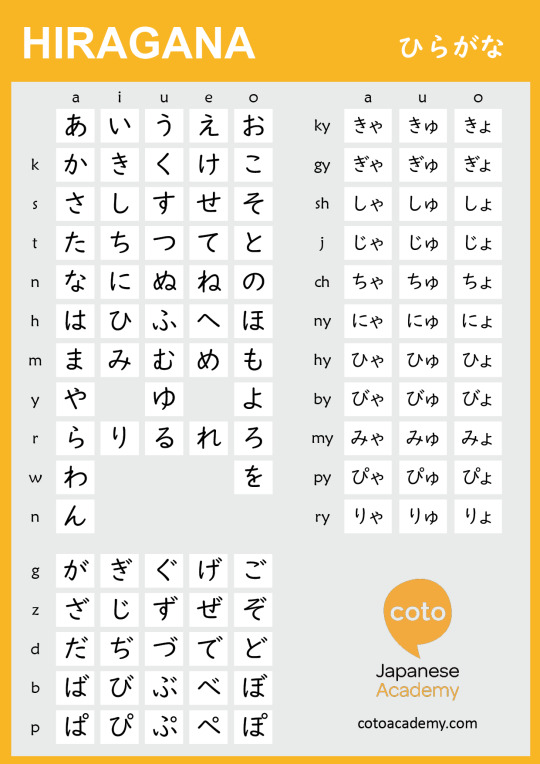
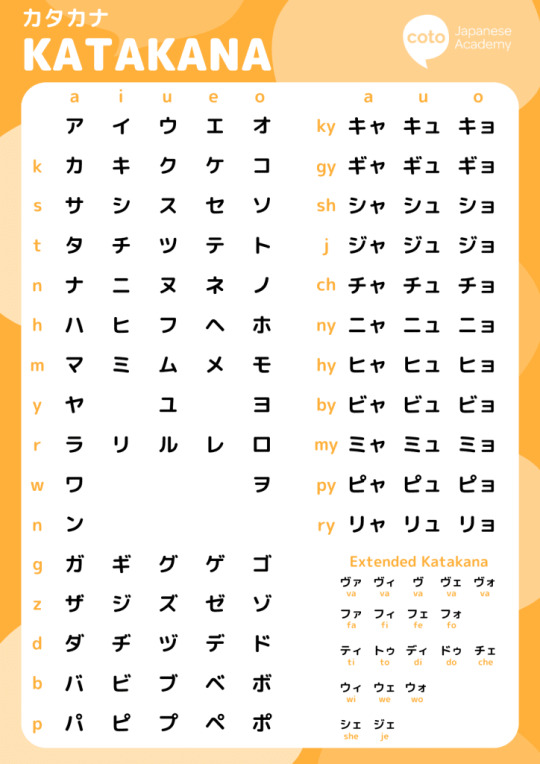
You'll learn these first for three reasons:
First, they are easier.
Second, you can spell any word in Japanese with these two scripts. Not a hard and fast rule, but Hiragana is used for native Japanese words and Katakana is usually used for international loan words, emphasis, names, and 'sound effect words', aka onomatopoeia.
Third, you'll see Hiragana above Kanji (the difficult one) that tells you how to pronounce Kanji.
As far as actually learning them, you *could* just write them down over and over.
Writing is super important when learning Japanese.
But it might be easier to start with some apps, games, and videos where you can learn the characters both in context AND within words.
Here's our favorite FREE resources:
Duolingo (Website, Android, and Apple) is great for learning singular words and Hiragana / Katakana, however explanations of grammar is limited to desktop. Still, PERFECT for the beginning stages regardless of device.
Bunpo is another free app for learning Japanese!
JapanesePod101's videos on Hiragana and Katakana over on Youtube are fantastic for hearing natural speach.
Tofugu's Hiragana and Katakana blog posts have the * best * mnemomics, with sound bites.
Busuu's (Website, Android, Apple) Japanese course starts off with Hiragana words to get you speaking immediately.
Kana (Apple, Android) is a free app dedicated to JUST Hiragana and Katakana.
Tae Kim's Guide to Learning Japanese is the holy grail for new Japanese learners. Of course, it has a no-frills explanations of all three scripts.
Japanese Ammo with Misa has detailed lessons on everything, including Kana.
Here's a video on the difference between printed and written Hiragana fonts.
And finally... our discord server.
Wait... what about Kanji?
Well, the problem is there's a lot to learn. A LOT.
You'll be learning them over the course of yearssssssss. But that's fine; you can tune into our lessons to learn them.
Join right here to practice what you learn! You'll also gain access to new friends learning the same language AND more free resources.
We can't wait to see you there!
#japan#japanese#japanese language#learn japanese#japanese studyblr#nihongo#japan travel#japanese culture#japan trip#anime and manga#anime#anime art
190 notes
·
View notes
Text
The Kazama & Mishima’s naming traditions and the Next Gens of Kazama’s children!
Alright so I've been cooking this for a while since they dropped Jun's parents name on T8. Bear in mind, I'm in no way fluent in Japanese nor I'm a native, but I have google on my side to educate me better about Japanese naming systems and the kanji they used for naming the child (jinmeiyo and joyo).
I just want to named XiaoJin’s future babies so bad, kay?! Lol. Even though I know Jin is opposed to any plan of continuing the lineage (which is heartbreaking 😭💔) but the XiaoJin's shipper in me cannot be extinguished!! 🔥🔥🔥 I still want to named them! Lol.
Anyway! Feel free to correct me with your information! I'm open to any kind of knowledge 💖
Psst! If you don't want to read these longass founds and explanation, you can jump right away to the bottom of this post, there’s a pic that summarise these texts, lol.
Alrightt! Without further ado, let's deep dive into Kazama/Mishima lore!!
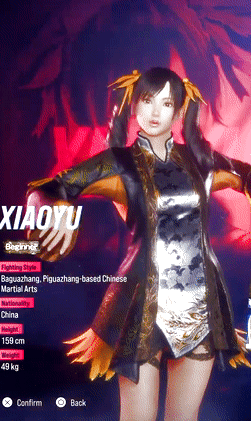
================================================
.
.
.
So...
Tekken 8 has finally dropped some lore about Kazama family, and it's about Jun to be exact. There, we can get a glimpse of Jun's parent name:
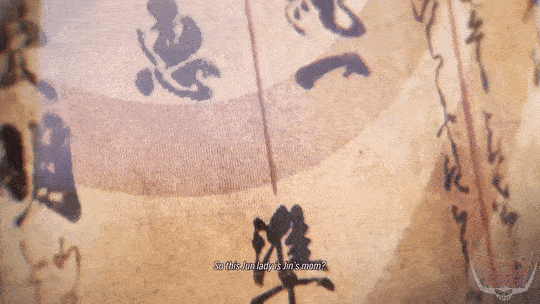
Soon after, a Japanese KazuJun's fan dropped this tweet :

Assuming a native Japanese able to decipher those characters correctly, now we finally have Jun's parents name kanji:
純一 the father, and 恵 the mother.
As we all know, kanji has several way of reading. Cited from pon-navi, there are two typical ways of reading kanji, kun-yomi and on-yomi. In addition, there is a reading system called "jinmei kun" which is used only for names.
"Soo?? What's their name?! How do we know the correct reading?!"
Here's the thing!!
Tekken has giving us hints that Mishima family has a tradition to give their children with their kanji name, following a common practice in Japan. Let's take a look at their kanji.
仁八, Jinpachi
平八, Heihachi & 一美, Kazumi
一八, Kazuya
Notice the similarities? You’re right! The Mishima child inherited their parents' kanji! The sons inherit '八' kanji, with Heihachi inherited '八' from Jinpachi and Kazuya inherited both kanji from Heihachi (八) and Kazumi (一).
As it is a common practice, the same can be said with the Kazama family! Although in their case, they might not be inheriting the kanji but instead with the reading of the said character. Or maybe phonetically similar would be correct here.
For example, this is Jun's kanji: 準
This character '準' can be read several ways, some of them are : Jun, shun, setsu, taira, toshi, narau, nori, hitoshi.
And one of her father kanji is: 純
'純' can be read as : kito, Jun, atsu, atsushi, aya, itaru, ito, kiyoshi, sunao, sumi, tsuna, to, makoto, yoshi.
Have you noticed it? That's right! '純' and '準' can be both read as Jun! It means that Jun's kanji has the same reading as her father's kanji, although they have different kanji characters.
From here, we can assume that Jun's father can be called Jun____ as well.
As for the other kanji, '一' can be read as: hito, hitotsu, hajime, ichi, itsu, i, osamu, kuni, susumu, tada, chi, nobu, hajimu, hajime, hi, hiji, hide, hitoshi, makoto, masashi, moto, ka, kazu, kata, atsu.
Looking from the lists, together his name could be read most plausibly as : Junichi, Junitsu, or Juni. Imo, Junichi sounds the best, so yeah, I completely agree with the KazuJun's fan.
Now we all know that Kazama has similar sounding name with different kanji.
On the other hand, the mother has '恵' that can be read as: megumu, megumi, kei, e, aya, sato, satoshi, shige, toshi, yasu, yoshi.
While it could be anything, I think it's either Megumi or Megumu. Why? Because I found out that '恵' has the same reading as one of Jin's kanji reading! lol. Let's take a look at Jin's kanji!
This is Jin's kanji: 仁
It can be read as: Jin, ni, nin, kimi, kimu, sato, sane, shinobu, tadashi, to, toyo, nobu, nori, hisashi, hito, hitoshi, hiroshi, masa, masashi, mi, megumi, megumu, yasushi, yoshi.
Do you find it? Both '恵' and '仁' can be read as Megumi/Megumu! lol.
One of the speculation is that Jun named her son Jin as a sign of respect to her father in law, Jinpachi (仁八). Even though Jin is a Mishima by blood, he doesn't inherit the '八' character as he was raised in Kazama family. So he inherited just the '仁' character. Besides, it also sounds almost the same. Jun.. Jin.. It's phonetically similar, right? And if Jin were born a girl, I bet he would be called Megumi/Megumu instead just like his grandmother, lol.
Thus, we can safely conclude that the Mishima has the habit to inherit their kanji characters while the Kazama inherit the reading of their kanji's name.
================================================
AND NOW! HERE COMES THE MAIN DISH!!!! 💖💖💖

What about the future Kazama kids?! Let’s move on to that and do the real cooking here for the XiaoJin's babies name! :D
We have seen Jin's kanji, but what about Xiayou?? Xiaoyu is Chinese by birth, and her hanzi (Chinese characters) are 凌曉雨 and リン・シャオユウ is how it's written in Japanese katakana.
���, Líng: surpass / リン (Rin)
曉, Xiao: dawn / シャオ (Shao)
雨, Yu: rain / ユウ (Yu)
Now, I'd like to think that they would combine or use either their character or its reading for their baby! Also! They might use some of Jin's family name's characters :D
Here are some of my ideas for the babies name :
For boy:
晨一, Shinichi, a portmanteau of Jin and Xiaoyu's nickname and kanji inherited from Junichi/Kazuya.
Explanation: the first kanji '晨' means Dawn, which has the same meaning as Xiaoyu hanzi '曉'. The kanji reading is also the combination of Xiaoyu's nickname and Jin. Shao+Jin=Shin. It also sounds similar. Jin, Shin, it's rhyming, right? Just like Jun and Jin!
For the second kanji '一' I'd like to think the story behind it was that Xiaoyu wanted to preserve Kazama/Mishima naming practice but Jin was reluctant to do it. In the end, they decided to take the kanji '一' which was present in both Kazama and Mishima, that's in Junichi (純一) and Kazuya (一八).
For girl :
凌, Shino, a portmanteau of Xiaoyu's nickname and Jin, same character as Xiao’s hanzi that could also be the feminine ver. of Shin.
Explanation: it’s rather simple, I use the same character in Xiaoyu’s hanzi that has different reading while also the combination of Jin and Xiaoyu’s name. In Chinese ‘凌’ read as Ling but in Japanese, ‘凌’ has several reading. One of them is Shino. Shino could be the sister or the twin sister of Shinichi, in case XiaoJin have two child or twins in the future :)
琳, Rin, a kanji that has the same reading as Xiaoyu’s name and phonetically similar with Jin.
Explanation: I think this one is easy to understand! Rin and Jin, phonetically similar like what Kazama would've named their children. It’s also Xiaoyu’s surname in Japanese. The kanji ‘琳’ itself means ‘beautiful jewel’ and in Chinese the hanzi means 'beautiful jade’, and it reminds them of the greens in Yakushima forest, Jin's home.
.
.
.
================================================
Alright, now that I’ve spilled out all of the stuff inside my chest and calmed down, I’ll give you a simple name chart for those who don’t want to read wall of texts, lol. Hope this helps!
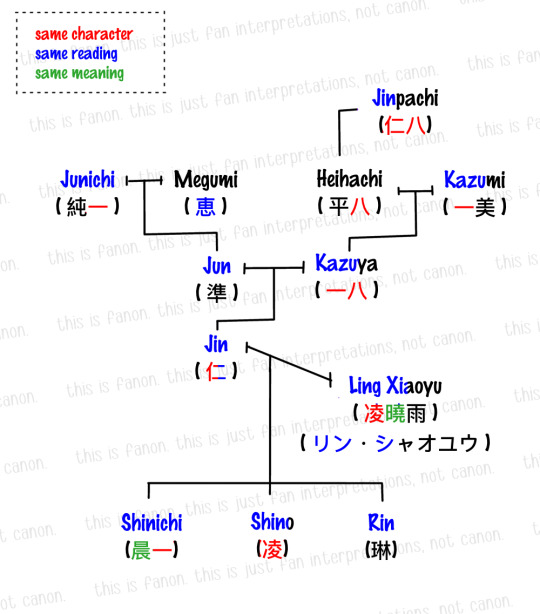
I guess that’s all for now, lol. I’ll add my thoughts if I had any later on. Thank you for coming to my TED talk! 😂🙏
#tekken 8#Kazuya Mishima#Jun Kazama#Jin Kazama#ling xiaoyu#Kazujun#XiaoJin#tekken#Heihachi Mishima#Kazumi Mishima#Jinpachi Mishima#tekken theory#tekken lore#Mishima family#Kazama family#Damnn this was a longass post!#Kudos to those who read all of this lol#feel free to correct me if i’m wrong or to add something!#I want to add my drawing but my hand is not in the best condition#so maybe later :)#*kamo
43 notes
·
View notes
Text
Question regarding mutual intelligibility in writing: Japanese and Chinese
Hello hello! For a thing I’m writing, I have a question for speakers/readers of Chinese and Japanese, which I hope someone will be able to answer.
I know that Japanese kanji, for the most part, have the same or similar meanings to the same characters used to write in Chinese. Is there much, if any, mutual intelligibility in reading them? If I have a character who is a native Japanese speaker/reader, would they be able to, say, read internet forums in Chinese and understand them, even though they don’t speak the Chinese language themself? I mean obviously they would pronounce the characters the Japanese way, but would they be able to understand the meaning? I’m curious, because I know Japanese tends to mix in hiragana and katakana with kanji instead of strictly using kanji, while (I think?) Chinese just uses the character system and doesn’t have a phonetic alphabet. (If I’m wrong please tell me! I studied Japanese for a few years in high school over a decade ago, and I don’t really know much about Chinese language and writing.)
I’d greatly appreciate it if anyone has an answer! I’m a native English speaker/reader, and I don’t know very much about character based writing systems as opposed to phonetic writing systems, so while this seems theoretically like something that could be possible to me, it it’s not, I’d like to know before I include it in my writing and make a fool of myself!
#languages#langblr#mutual intelligibility#japanese language#japanese writing#kanji#chinese language#chinese writing#writeblr
102 notes
·
View notes
Note
Can you do the new sternritter's Vollstandig Name in the new anime?
Oh yeah, I wasn't sure if there had been any kanji released for that but it seems like the Bleach wiki has something up there for them, although they haven't cited their sources, as usual... They cite the chapter and episode they each appear in respectively, but go figure, you guys... the anime appearance does not include t e x t. So no idea where either the kanji or the romanized names came from.(wait did they get the kanji and katakana from Japanese closedcaptioning? Do they include furigana on [cc] in Japan??)
This wound up way longer than I'd intended...
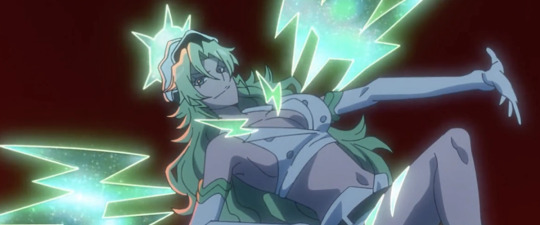
Balbarriel[神の雷霆] phonetically, BA-RU-BA-RI-E-RU[バルバリエル]. So weirdly this is how Japanese defines the name Ramiel/Remiel/Reniel[רַעַמְאֵל] the name of an actual biblical angel, so both Japanese epithets here, plus the original hebrew all translate as "Thunder of God." But oddly it sounds a lot more like Bariel, which is an angel named in the Ars Paulonia, part of the Lesser Key of Solomon, a grimoire foundational to a lot of the surviving legacy of Christian occultism and demonology nonsense.(i.e. It was some nerd's 18th century Pokedex of fanfic and headcanons.) That being said, it has no actual meaning the way biblical angels(Gabriel, Raphael, Ariel, Uriel, Michael, etc...) do, because it's not hebrew and the idiot who made it up in the 1800s obviously didn't know what he was talking about. It is of course the exact same kanji used for her Schrift The Thunderbolt[雷霆].
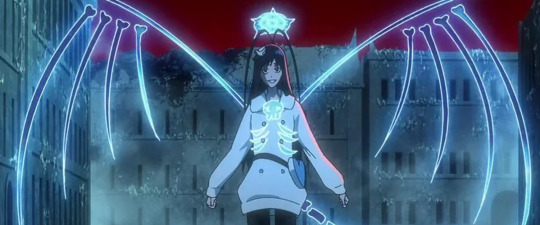
Azhalbiora[神の死] meaning "Death of God" and written as phonetically A-ZA-RU-BI-O-RA[アザルビオラ]. Other than seemingly a little lazy the name just kinda doesn't make a lot of sense as a name for her power. And once again there is no apparent basis in actual angelic names so it's not like there's context to work with. It has an almost vaguely fake "arabic" sound to it? Like the sort of shit H.P Lovecraft would've come up with?
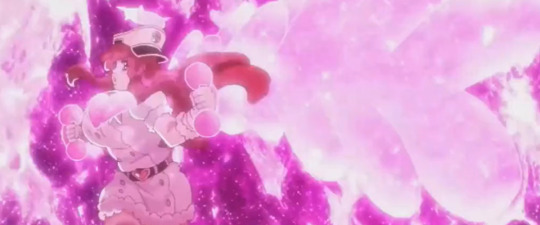
Pornipora[神の力] I'm sure any weeb worth their salt can recognize the kanji for "power," so it's "Power of God." And the phonetics are POO-NI-PO-RA[ポーニポラ].
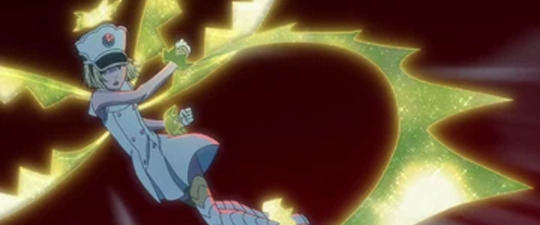
Gagael[神の飢え] at last something resembling creative input! "Hunger of God," in which [飢え] is not just directly lifted from her existing Schrift. ([食いしんぼう]: "Glutton/Gourmand." Same root kanji though so they weren't thinking that hard.) And while the phonetics, GA-GA-E-RU[ガガエル] are yet more gibberish, they at least go back to the sort of appropriated hebrew -el[אֵל] meaning "of god" used in the names of the aforementioned biblical archangels.
[edit]: and since there's a new one to add to this list...
So, you've probably noticed these all just use the same kanji as the girls' actual Schrifts, so there's nothing terribly clever going on, which isn't too surprising but is kind of a shame no one took the opportunity to get creative with it. (Even the attacks names they peppered into the extended fight scene were a little too goofy and bland for my taste. I mean, come on, giving Lili attacks called Spork and Spife?? Really?)
Thunder[雷霆] and Thunder[雷霆]
Deadperson[死者] and Dead[死]
Power[力] and Power[力]
Glutton[食いしんぼう] and Hunger[飢え]

For comparison the side by side on Kubo's actual Vollstandig and associated Schrift were:
Prison[監獄] vs Righteouness[正義]
Fear[恐怖*] vs Be afraid(of)[怯え] (*technically As Nodt's Schrift was never written out, but that's the kanji he used talking about "Fear" all the time when using it so I consider it a safe assumption.)
Love[愛] vs Love[情愛] (I don't know how to clarify the distinction between these two words... the former is more broad? Like it can include a few extra examples the latter can't?)
Penetrate Everything[万物貫通] vs Judgement[裁き]
Lethal Dose[致死量] vs Tasting(for poison)[毒見]
Miracle[奇跡] vs Authority[権能]
Oh and also the names
Piskiel[ピスキエル]
Grimaniel[グリマニエル]
Tatarforas[タタルフォラス]
Gudoero[グドエロ]
Jilliel[ジリエル]
Hasshein[ハスハイン]
Aschetonig[アシュトニグ]
Are basically all gibberish too, so I can't exactly say the names don't fit a "pattern," since there isn't on, but they still don't feel quite right to me, save maybe Lili's. Hasshein and Aschetonig are at least clearly playing with German-esque phonetics*, and Piskiel, Grimaniel, and Jilliel are all playing into recognizable angelology cliches. (Gudoero/Gudoel might be too, but in a way that's hard to separate it from the clearl intentional "ero" wordplay. It just doesn't work outside of th eJapanese phonetics.) And Tartarforas is just suspiciously close to Tartarus but otherwise doesn't really register to my ear as any language that would make sense in the context of the Quincy's associations...
Wait... The German sounding ones might actually be German after all. Like, bad German, but technically German...

*Asche is a n fact German for "Ash," and Ton is "Clay," in fact Tonig can mean "Clayley" as in "Clay-like" so I guess Gerard's actually is German for "Clay-like Ash"... That's actually kind of cool, and vaguely biblical? Adam being sculpted from clay, and "Ashes to ashes, dust to dust" and all that? Huh... Weird I never bothered to actually check that I guess, I just assumed if most of them were nonsense that even the ones that sounded more legit would be too...
Wait... Damn... have I really been slacking this much???

The Haß sound in Hasshein could be the German for "Hate" and although it's not really a ""word"" in a functional sense by itself, hein is a part of the term Freund Hein is a kind of grim reaper where, I guess "Hein" was kind of an old euphemism for the devil for some reason? So, Death personified is the "Friend (of) Hein/TheDevil" but I'd bet the intended reading of Kubo's slapdash German here would be "Hate(s) Death" as is suitable to Askin's whole shtick of narrowly avoiding death.
I'm mad I never sat down and tried to hash those out sooner...
#bleach#bleach meta#quincy#sternritter#vollstandig#candice catnipp#giselle gewelle#liltotto lamperd#meninas mcallon
34 notes
·
View notes
Text
HIDE Inspiration Talk 50 (# 45 - 47) - Translation
Underwear
During lives I wear briefs. Or nothing. Because briefs fit me well. They sit tight. They don’t fall down if I move around a lot (laughs). I get them from my female fans so I don’t buy them myself. But lately, I’ve been getting a lot of T-backs and O-backs from the fans, so what should I do now? (laughs)
Value
I feel like value lies in “flair” and “encounters”.
Clothes
Lately, I switched over to more appropriate, casual clothes. Because when I get up, I just put on the first thing that’s within reach. I don’t have a preference, though – what I put on, I wear. Outside of the things I wear myself*, though, I would, for example, tell girls, “You should wear something like this,” but then I often get told, “That’s laaame.” (laughs)
*) Full disclosure: I translated this line (自分が切るもの以���) assuming a transcription error. The source used the word "cut" (切る) here, but I translated it as "wear" (着る), which is phonetically the same ("kiru") but uses a differnt kanji. If anyone knows better and can give me the correct translation, I'll be happy to correct it.
#hide#HIDE inspiration talk 50#translation#words of the bean himself#translating from a language you barely understand is not made easier if the source text has errors in it#if that is indeed what happened
17 notes
·
View notes
Text
regarding the official spelling of names:
japanese for children's media is often written in kanji with small phonetic characters called furigana included for assistance with pronunciation. (furigana can be either hirigana or katakana.)


you can see here that light's name is written with the kanji for 'moon', and beside it the furigana spells out 'ra - i - to.' this is useful because it's a nonstandard pronounciation. on on the bottom, we can see that L's name is rendered as the english character, with furigana spelling out 'e - ru'. this is useful because it's a foreign letter children might reasonably be unlikely to know; an english-speaking reader would of course be able to read the english easily. you can also see that furigana is provided for ALL kanji, not just the names. the characters without furigana beside them are hirigana, and are therefore already phonetic. it's especially useful for these names, but it is not being provided specifically for them. i feel english speakers often treat these phonetic pronunciation as the correct japanese forms of the words, but this isn't really the case for the same reason that 'yagami' isn't the correct english pronunciation of 夜神 -- 'yagami' is a very natural pronunciation and i wouldn't say it's wrong, but 夜神 is still the pronunciation that's being approximated. likewise, 'eru' isn't strictly wrong, but an english speaker insisting on this pronunciation can have very strange connotations.
25 notes
·
View notes
Note
Now I'm wondering how countries like Japan and China teach literacy.
Since kanji / hanzi don't really have that much in the way of phonetic elements, they kinda have to teach them by memorization and I don't think they have many reading comprehension problems over there.
(Although both countries do have supplementary phonetic writing systems in the form of bopomofo and pinyin for China, and the kanas for Japan)
--
FAVORITE SOAPBOX TOPIC UNLOCKED!
RELEASE THE KRAKEN!
It's a little closer to teaching vocabulary than spelling, but the same kinds of principles apply: You teach the building blocks, like the traditional radicals, which aren't so different from teaching Latin and Greek roots in an English class for English speakers.
And, as a matter of fact, lots of those radicals do predict pronunciation, just not in every single case. They can also be clues to meaning, but again, not absolutely consistently. Many characters have a sound-cueing radical on one side and a meaning-cueing radical on the other. It's just that only some are still useful in the modern day, while others are more like the English word 'plumbing' where knowledge of Roman lead pipes explains why this word comes from the one for lead, but the root probably wouldn't help a kid learn the word in the first place.
One similarity to teaching phonics would be teaching students to tell very complicated and similar characters apart: you want to help a student spot all the little building blocks of the character and then spot the ones that are different, not just glance at the whole character and get a general overall vibe. If you do a whole look-based approach, too many characters are too easy to mistake for one another.
Remembering a bajillion Chinese characters is hard if you're trying to memorize them in a year and not all of elementary school, but I think people who don't read them underestimate how many component parts there are and how approachable they can be if you start by learning fundamentals, not just memorizing a few individual characters as though they have no relation to anything else.
They're actually pretty systematic, just in the way that English spelling is with its overlapping systems and historical artifacts, not in the way that highly regular Spanish spelling is.
Having taken a lot of Japanese classes, I will say that Japanese as a foreign language textbooks often do a piss poor job of this and totally do teach kanji in a sight words-y way... But my Mandarin class started with important foundational concepts that served me well in Japanese later even if I bombed out of Chinese class at the time.
Can you tell how irritated I am by all the foreign language learners who think characters are sooooo hard when, really, it's just their crappy textbook? Haha.
They're moderately hard in the way that learning a full adult spectrum of vocabulary is hard, but people do that for foreign languages all the time. The countries that use characters do tend to make sets that are smaller for certain kinds of applications, same as we have things like simple English wikipedia, but a literate adult will always know lots more, whether it's from their career in engineering or their predilection for historical romance novels.
Uh... anyway, the answer is "Bit by bit in elementary school, just like in any other country".
684 notes
·
View notes
Text
Long overdue final ebg post (lmao) bc I need to get this out of my system...
Tag for all the posts/storyline
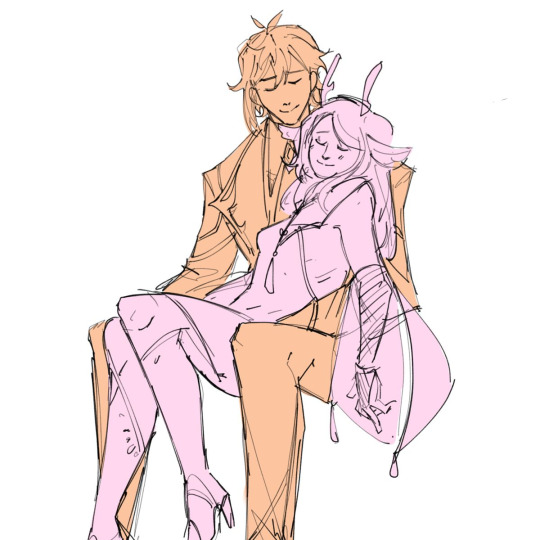
Art by the amazing lovely precious cutie Aine @/ainescribe
First of all I want to thank @i23kazu immensely for allowing me to participate pls I was SO unsure at first haha and she absolutely killed it with the interactions, the lil side project, the prompts, the scores tally... it's just so much work, kudos to you Ying fr!! It was a super fun game.
Shoutout to my besties/mutuals
@silentmoths @ainescribe thank you for your lil asks I love seeing your characters aaaaaaaa 💕
@floraldresvi @moraxsthrone and all the anons I got, your sabotages here and in discord were brutal omg Vi you almost made my cry //pos bc I wanted to react/respond to Li's messages 🥺 EVERY SINGLE TIME ghgnhgnghgn and NOT KEL MAKING MY GIRL HAVE A WET DREAM/SPICY MEMORY TYVM 💕 the way I had to contain myself hELP I loved it svcgavscgvsjgacbkackl
@meimeimeirin you also sabotaged me a lot, meanie //pos I loved SO MUCH your asks/little stories aaaaaa thank you for engaging so much when I know you're super busy 🥺 it def made my day everytime, ty for bringing the girl home and solving my silly lil mystery hehe 💕
@kurikurikurisu GIIIIIRL it's so funny to me that we kinda started interacting more on the last ebg for Rin and then I was like "she's a cool person I wanna fren.... 👉🏻👈🏻 but I shy...." took my sweet time to invite you to the server and turns out THIS ebg got us closer (I think? ehe?//hit) we didn't interact much in tumblr with each other's plots but bOY were we emotional support in discord, we really were in this suffering together 🤝🏻 mhm //nods nods 🤣 thank you so much for being interested in my lil silly plot and my girl aaaaaa
As for the "plot" and other things... (this got so long I am so sorryy;;;)
Well at first I wanted to do kinda a normal ebg, no plot or anything bc I don't think I have the smarts to do an elaborate game/story lmao and I kinda wanted to have more established s/i lore?? And then I realized hey I can use the ebg to introduce my s/i!!!
See I'd been working SO hard on her names lately, researching and studying in-game adepti lore and stuff and I though why don't I make it a simple game where the goal is to guess her name (with me giving hints ofc) and at the very start I had the idea of her losing her memories so she could re-discover/remember things about herself alongside the "players" learning them. Whoever character I got as my bias would help her and get to know her too along the way, even npcs (or in the rare case of me getting Dottore/Pantalone, probs be the villain for her memory loss lmao)
And then I got Kazuha. And it was so SO perfect. I took inspiration from Spirited Away with the plot point of having your name/memories/identity stolen and for some reason I remembered the whole Ino-shika-cho koi-koi card combo from Summer Wars I just had this vivid mental image of a scene where Kazuha dropped the biggest hint by writing the Kanji for Butterfly (Chō) which doubles ofc as the Hanzi for Butterfly/Crystalfly (Dié) written the same pronounced (and romanized) differently :3c
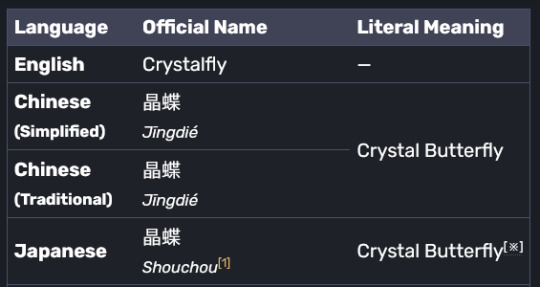

I was very proud of myself//hit also

I did not end up making haiku bc they are complicated but I at least tried to loosely keep/emulate the 3 phrases, phonetic rhyme and sensory elements while referencing my lil plot lmao
✧˖Originally I was gonna blame it on a playful tanuki or smth but I don't think they're powerful enough youkai lmao it was probably a kitsune.... we may never know ✧˖She was technically never in any danger yeah but imagine being lost with no memories and no way to know if you could get them back even because every person she met kept telling her they didn't know ofc she'd break down, or at least me, I'm very crybaby and neurotic sometimes//HIT ✧˖Yes this entire thing was technically Zhongli's fault since he did write her a letter addressed 亲爱的晶蝶 ("My dear Crystalfly/Jingdie") and that IS her name woops on a random note I kinda imagine he also signs with something like 你的龙 "Your Dragon" and vice versa with Crys ("My dear Dragon/your Crystalfly") sgcvgajsvcjhacbajkca //squeals kicks feets
And all this started because I was stressing over the fact that "Crys" is not an appropriate name for a Liyue character lmao, I debated for so long giving her a chinese name, but I didn't want to further make her an OC I wanted her to represent me/my blog (also part of me was and still is immensely worried I somehow insult cn ppl by being as some sort of weeabo equivalent or that I am "appropriating culture" or idk I may be dumb but I try to do my research and I prommy it does not come from a place of malice or anything I genuinely love genshin and Li and it's got me interested in a culture/country I funnily enough have somehow interacted with and have friends in but never really paid that much attention to ig...) and then I just had the epiphany What if I just reverse engineer and name her Crystalfly in cn? Lore would be that either her name got accidentally translated in documents a long long time ago and ppl started calling ehr Crystalfly/Crys and she rolled with it or she simply adopted the translation/nickname as her name for international settings, keeping her true name more private (hidden in plain sight tbh) p sure the only ones who know are the elder adepti (Ganyu/Xiao included) and Neuvillette (once he told her his real/first name) (ironically Crys may be harder to pronounce i other languages lmaoooo rip Fontaine)


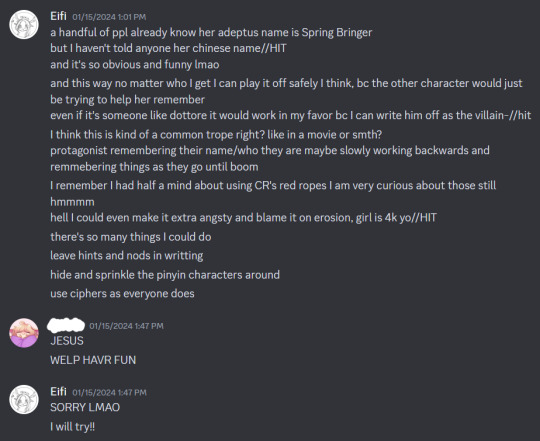
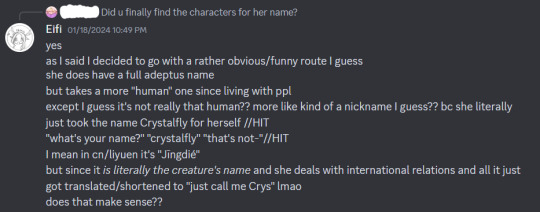
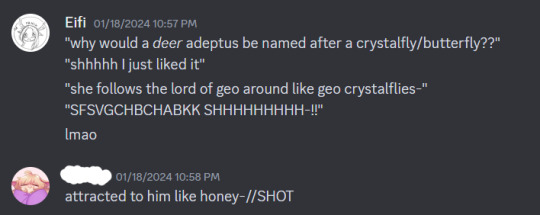
Anyway this got way too long lmao sorrryyyyyyyy thank you everyone kith kith love y'all bye!! 💕
#crys plays ebg#final post aaaaaa this was all so satisfyinga nd fun and such a roller coaster dshvhsjdbvhsbvks#crys lore#new tag aaayyyy//HIT#I will spam more in the future but not too much I prommy#I gotta go back to writing soon I'm itching hhhhhhh#ty everyone ilu all <3#crys yaps
12 notes
·
View notes
Text
I dedicate this post to @mejomonster because it would have never crossed my mind to research on my own if you hadn’t told me about hanzi radicals linking to the pronunciation! I didn't think there could be a logic given how many different readings a single kanji can have compared to its equivalent hanzi.
Well, I never did study kanji extensively, which explains why I never knew that some radicals are connected to the pronunciation in Japanese - it seems to be common knowledge among people who are more proficient in the language, but it's almost never mentioned in language learning materials, ostensibly, because people think it's not useful enough to teach.
They're called phonetic components. And they're not as useful as the hanzi equivalent, but they do exist. There are a few caveats in their usefulness: 1) it only applies to on readings, 2) it's not always clear which component is the phonetic one and which is the radical (radical here meaning the one the kanji is classified under in the dictionary), 3) only 67% of kanji have phonetic components, and 4) about 25% of those have irregular readings.
This online dictionary lists the meaning of each kanji and the phonetic component they're linked by.
This article provides a list and discusses this a bit, scroll down to the "Phonetic Compounds and Their Kanji".
This webpage describes some of the research behind the components and two people who put in a lot of work to compiling the list.
I feel stupid for never realizing there is a relationship between the reading and the component, because one kanji/radical I've seen a million times makes it super clear and I just thought it was...a coincidence? I guess??
For example:
The on reading of 義 is gi - alone it is the 'righteous duty' character. It is also part of the following kanji: 儀 as in 儀式 (gishiki, ceremony) and 犠 as in 犠牲 (gisei, sacrifice).
Kanji readings are still difficult, granted, but at least there is some logic to some of the on readings. I don't know if they share some of the same phonetic-component relations as their Chinese counterparts, they might not, or they might but again are more related to an older Chinese language and not so much Mandarin.
For example, 牙 is ga in Japanese but yá in Mandarin and ngaa4 in Cantonese.
For kun readings...there's no logic but only 37% of the dictionary is kun readings, and 53% are on readings, according to one of the articles? If that makes it better haha?
I personally find kun readings way easier to remember. In fact, most of the kanji I know, I identify by their kun readings. 川 is kawa first to me, and 山 is yama, not sen and san.
So, yes, might not be useful for a lot of people, but it's certainly interesting. And at least demystifies kanji a little bit, which is always nice. People, including myself, are always saying how hard kanji is to study, and it's definitely true, but it also becomes almost like a self-fulfilling prophecy at some point.
"It's so confusing, I'm never going to remember them all" and such. But that's why it's interesting to learn different tricks to learn them. It might not help some people, but for example, this makes more sense for me than using mnemonics or making up stories to remember kanji. Even if it only helps me learn a few dozen kanji, that's still more than I would have acquired otherwise (or, at least, not without another 10 years of seeing it over and over again until it finally clicks in my head).
22 notes
·
View notes
Note
i wanna know how you learned a bunch of scripts did you find any special techniques or certain websites or something that help?
I think I just focus most on finding some kinda way to use a language in that writing system! I always try not to memorize language, including writing systems, but ofc some of that does happen anyways at the start lol.
When I learned kana and hangul as a kid (like 12/13) I think I mostly just very poorly transcribed a lot of english into those two adkjfg which doesn't give you a strong sense of the way the corresponding languages are actually written, but I definitely learned to read a little like that lol. I also just tried reading kpop song lyrics a lot in hangul which was really good practice! I tried for kana too but the transition to reading a syllabary was just too much at first akjfdgh
With Cyrillic (~14y/old) I started with little alphabet songs on youtube, things w little words for each letter, then some basic vocab. actually this video specifically lol, having the sounds/letter names/easy vocab all together definitely helped.
Still nowadays I like to use things like songs and basic vocab a lot! I'll probably start with a youtube video of the alphabet (plus how to handwrite it), then I'll just write that down and start learning some vocab in that writing system. Also, going back to avoiding memorization, I try as soon as I can to use resources that don't transcribe the words into the latin alphabet. I still usually have to go back and check characters now and then, but as long as the script is phonetic I try to just remember the sounds and practice reading/writing them.
Songs do kinda the same thing, where even if I don't understand it I can learn the sounds, and then I connect those sounds to the characters. I think it's easier than trying to learn new words all the time, or starting w/ written language and having to remember all the characters. esp for abjads where there's more sounds just Implied.
It also might take some digging, but I'll try to find super basic books, like for preschoolers and the like w/ just a couple words on a page. but easy vocab videos tend to fill the same niche too, esp if you can find them without english. Also, make sure you consistently work in writing practice, it really helps.
And for stuff like kanji, I mostly treat that like how to learn individual spellings of words in alphabets. I think writing is extra important for kanji because you wanna get exposure to/learn the radicals, that way the characters don't just look like a jumbled mess and you can distinguish things like 時/持つ/待つ. plus, since I know kanji/radicals in general, it's way way easier to learn new kanji, and I can kinda guess at ones I don't know. I also have a little browser extension to give me furigana (hiragana written above kanji to show how it's pronounced) which has been helping too, so I can get the reading and then either look it up easier or just guess based on the context and the radicals
#long post#i kinda meant for this to be shorter but. I have like 10 years almost of learning scripts adkfjgh there's so much in my brain#also the fact it's almost a decade is insane#gender-void-partially-stars
3 notes
·
View notes